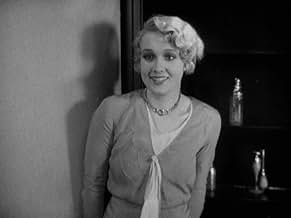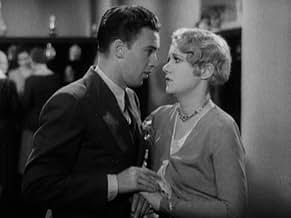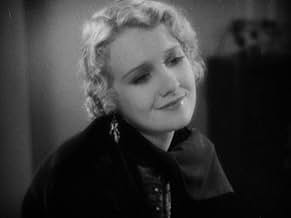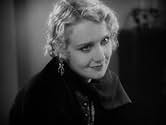Aggiungi una trama nella tua linguaThree department store employees, Connie, Franky, and Jerry, share an apartment together in New York City. Despite Jerry's pragmatism, Connie and Franky pursue wealthy men for financial gain... Leggi tuttoThree department store employees, Connie, Franky, and Jerry, share an apartment together in New York City. Despite Jerry's pragmatism, Connie and Franky pursue wealthy men for financial gain, leading to disappointment and heartbreak.Three department store employees, Connie, Franky, and Jerry, share an apartment together in New York City. Despite Jerry's pragmatism, Connie and Franky pursue wealthy men for financial gain, leading to disappointment and heartbreak.
- Regia
- Sceneggiatura
- Star
- Premi
- 3 vittorie totali
- The Detective
- (as Robert O'Connor)
- A Mannequin
- (as Wilda Mansfield)
Recensioni in evidenza
You can really see the onset of the Great Depression having an effect in this final film of the trilogy. The first two films involve lots of melodrama, but there is also widespread prosperity and a focus on living it up with partying that reflects the excesses of the 1920's. This final film really isn't about living it up at all. It's more about three shop girls just getting by and how the men in the lives of two of them (Anita Page and Dorothy Sebastian) promise the good life but end up raining down tragedy upon them, while the third shop girl, Gerry (Joan Crawford), has her own cynical attitude towards men reinforced by watching the fates of her two friends. That makes the ending seem a little tacked on and even unbelievable to some degree, but it's still a good film.
Unfortunately this film is neither on DVD or VHS. "Our Dancing Daughters" and "Our Modern Maidens" can be found on used VHS copies, but the transfer is pretty blurry. None of the three is on DVD, and considering their place in Joan Crawford's filmography, I find that to be a shame.
Though the plot developments are contrived even by the standards of the day, this is not a bad entertainment but it suffers midway when the progression of events grinds to a halt in favor of an elaborate but not very imaginative fashion show, ostensibly to impress female moviegoers, or perhaps to show off Crawford's beautiful body and skill at posing. She gets the star treatment here, frequently in dazzling close-up. Sometimes her facial expressions veer a bit into semi-dementia, but she restrains herself admirably. Anita Page does very well as the innocent victim of the thoughtless Hackett. Sebastian's role is in the wan mode of ZaSu Pitts; she has an amusing drunk scene. Montgomery, born to wear white tie and tails, must have gotten a big career boost with this one.
If nothing else, this film can probably boast the most impressive tree house ever created for the screen.
This is a pre-code film, and despite the above-mentioned problems, they're always interesting to watch. This one had to do with giving in to one's baser instincts (having sex) for money and the good life. This is 1930, and America was still preoccupied with class distinctions. Gerry refuses to give in to Tony, but her roommate Connie (Anita Page) is kept by his brother David. Franky (Dorothy Sebastian) marries a big talker.
Two scenes stick out as a sign of the times - outside Gerry's apartment building on a hot summer night, the street is teeming with kids playing, an ice cream cart, and people sitting on the stoop. A very realistic portrayal of cities back then. With no air conditioning and no television, people sat outside for the air and to talk with their neighbors. Social interaction, not social networks, Internet, and cable, provided their entertainment.
The second striking thing was the radio description of an engagement of a couple from socially prominent families. I remember seeing an old Vogue magazine where an woman engaged to some sort of royalty got a full page portrait. Not uncommon.
For anyone who only knows the hard-faced Joan Crawford of later years, this movie will serve as a revelation. Made for movies with those huge, mesmerizing eyes, beautiful face, and trim figure, Crawford shines here. At times she sounds like she's sporting some sort of affected accent, though I don't know why. Page and Sebastian are also very good in their roles. Montgomery is underused - he was more than a dashing leading man - but he looks great and does the role well.
All in all, worth seeing for the young Crawford and a look at life in 1930 for shop girls.
Lo sapevi?
- QuizJerry tells her malingering roommate, "Snap out of it, Lady Vere de Vere." This lady was the subject of a poem by Alfred Lord Tennyson. She was the haughtiest and coldest lady in the peerage, and the one with the noblest title. Her name has become an ironic way of referring to someone who is acting snooty.
- Citazioni
Mrs. Hinkle, the Landlady: Mr. Carter, third floor front. He's a process server. That's a real influential job. He thinks you're pretty nice. He'd like to take you out.
Geraldine 'Gerry' March: No, thank you, Mrs. Hinkle. You see, I'm avoiding process servers this season
- ConnessioniFeatured in Joan Crawford: The Ultimate Movie Star (2002)
- Colonne sonoreThe Wedding March
(1843) (uncredited)
from "A Midsummer Night's Dream, Op.61"
Written by Felix Mendelssohn
Played during the opening and closing credits
I più visti
- How long is Our Blushing Brides?Powered by Alexa
Dettagli
- Data di uscita
- Paese di origine
- Lingua
- Celebre anche come
- Our Blushing Brides
- Luoghi delle riprese
- Azienda produttrice
- Vedi altri crediti dell’azienda su IMDbPro
Botteghino
- Budget
- 337.000 USD (previsto)
- Tempo di esecuzione1 ora 42 minuti
- Colore
Contribuisci a questa pagina





































